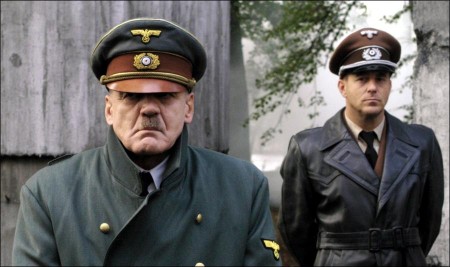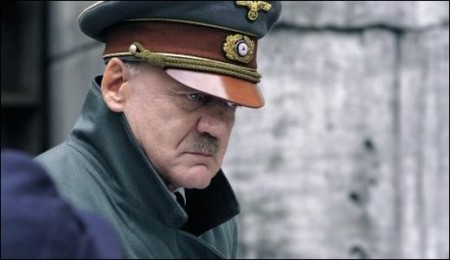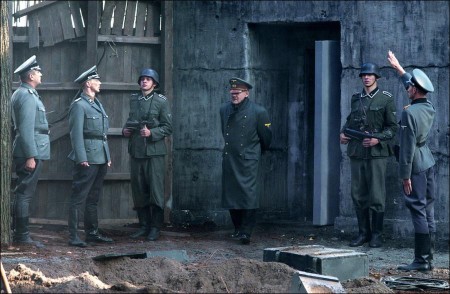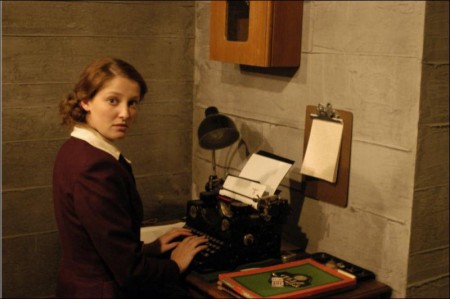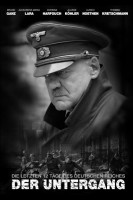When writer – producer Bernd Eichinger read the galleys of historian Joachim Fest’s book “Der Untergang” (“The Downfall: Inside Hitler’s Bunker, The Last Days of the Third Reich”), he knew he had found the dramatic key to a film he had wanted to make for decades, but never thought possible due to its scope.
Fess’ book focuses on the final days of the Reich, and Eichinger saw that the horrifying epic of Hitler and his people during his twelve years in power was reflected in those last twelve days in the bunker. “The final days tell us a lot about how the mass fanaticism functioned in the regime’s earlier years and how it continued to reign until the bitter end,” says Eichinger.
Eichinger read another very important book around the same time he read Fest’s; the memoirs of Traudl Junge, Hitler’s private secretary (“Until the Final Hour: Hitler’s Last Secretary”.); which was later made into the documentary “Blind Spot: Hitler’s Secretary.” “Fest gave me the time frame, Traudl Junge gave me the character who could hold it all together.”
“Downfall” is the first German film to broach the subject of Hitler straight-on since G.W. Pabst’s 1956 “Der Letste Akt” (“The Last Act”) which was told from the point of view of an ordinary German soldier, played by Oskar Werner. Says director Oliver Hirschbiegel, “In terms of German film history, we are breaking new ground here, since there is no cinematic frame of reference.
After reading the book, it was clear to me that if I committed myself, then it would have to be a total and complete commitment, meaning that I was going to spend two years of my life in the Third Reich, with all of those characters and that primitive ideology… My hair stood on end. My wife advised me against it. Yet I noticed that it just wouldn’t leave me in peace, and in my heart, before accepting the project, I knew that I had already opened myself up to it.”
Character Introductions
The movie flashes forward to Hitler’s 56th birthday, April 20, 1945. Traudl Humps — now Frau Traudl Junge — is living in the Führerbunker with Gerda Christian and Constanze Manziarly, another secretary and private cook, respectively, for Hitler. Artillery fire wakes the trio, and generals Wilhelm Burgdorf and Karl Koller explain that the Russians are twelve kilometres from the city center. Hitler is visibly aged, his left arm continually shaking, and in ill humour.
Bruno Ganz as Adolf Hitler
The birthday reception introduces Heinrich Himmler and his adjutant Hermann Fegelein, Nazi Party Leader Martin Bormann, and Walther Hewel of the foreign ministry. Hitler reveals his intention of staying in Berlin, and Fegelein’s intention to leave. Hewel and Himmler urge Hitler to seek a diplomatic solution, which Hitler rejects. Later, Albert Speer and Eva Braun both reject Fegelein’s advice to decamp to Bavaria. Speer advises Hitler to be onstage when the curtain falls. Eva’s character is revealed with her remark, “He is the Führer”; he knows best.
Elsewhere, at a large office building, “Operation Clausewitz” is in effect; documents are destroyed, artwork moved, and SS-Doctor Ernst-Günther Schenck is introduced as the officer responsible for Berlin’s public safety and the flight of the SS medical infrastructure. Schenck argues with a superior officer to remain in the city. Meanwhile, in the government district, Himmler reveals his secret negotiations with the Allies; Fegelein cautions him against treason.
A sub-plot about Hitler Youth soldier Peter Kranz and his father is introduced. The father, missing an arm lost in another war, begs his son to accept that the war is lost and soon will end and to return home. Peter’s teen-aged commander, a lieutenant in charge of an 88mm anti-aircraft gun, tells the father he should be proud of his son, Peter, who is to be decorated by Hitler for having destroyed two Russian tanks that day. The father continues trying to talk reason to his son, and his comrades, and leave. They refuse, bragging that they will fight to the last man. The angry Peter runs away, calling his father a coward.
Back in the Führerbunker, generals Wilhelm Keitel and Alfred Jodl advise Hitler of their bad military situation. Hermann Göring is briefly seen. Hitler is outraged when his impossible military orders cannot be executed. Propaganda minister Joseph Goebbels is presented as the obsequious toady responsible for buttressing morale with grandiose talk of master plans and secret weapons. SS General Wilhelm Mohnke is depicted as a square-jawed professional soldier charged with the government district’s defence. He tells Hitler that many civilians must be evacuated, but his suggestion is denied. After the meeting, the officers agree the Führer has no sense of reality. Fegelein suggests they tell Hitler, however, rationality is ruled out, given their death-pledge to Hitler. Later, Hitler decorates the Hitler Youth tank killers, including Peter Kranz, while Goebbels and Speer observe.
The Plot
Afterwards, Junge discusses her future with her friends in the bunker, while Schenck and his adjutant camp outside the now emptied hospital. Schenck says that they should go, since they are not much use now. Eva Braun decides to hold a party for the inhabitants of the Bunker. Meanwhile, Hitler discusses his scorched earth policy with Speer. Speer begs Hitler to spare the German people, but Hitler claims that if they fail this test, they are too weak in nature and must be exterminated.
During the party, a shell explodes nearby, interrupting the music. Eva Braun ignores it and starts a record to play swing music. Junge feels sick. Another shell explodes at windows, shattering them and spraying dust and debris. The party is stopped; Traudl shrieks in fear as she is led back into the bunker by Gerda.
The scene then shifts to the heat of battle, where General Helmuth Weidling is accused of retreating to the west. He argues that he is only a single kilometer from the front lines. A shell explodes, cutting his telephone line; he decides to personally report to the Bunker. Weidling is received by Heer Generals Hans Krebs and Wilhelm Burgdorf. Krebs explains that the Führer has prohibited any western retreat, any officers disobeying are to be arrested and shot on the spot. When Weidling denies this, he is told by Burgdorf to explain himself. Weidling lifts the Knight’s Cross at his neck and tells Burgdorf indignantly, “Don’t you dare use that tone with me!” He is then taken to Hitler’s office to give his report on his position. His report impresses the Führer and he is assigned to take command of Berlin’s defenses. Weidling is clearly not pleased with his new job. “I’d rather be shot than to have this honour,” he mutters.
Back in the streets, Kranz is attempting to defend a position from a Russian tank attack. As the Tank Alarm is raised, he tries to jump out of the trench he and a soldier are in, to fire. The soldier tries to stop him, but is shot down by a Russian bullet. As Kranz sees the soldier die, he gets scared, dodges the Russian gunfire and dives into a hole in the ground.
The scene then switches back in the bunker. Hitler is discussing the situation with the generals. Outside, Junge still naively believes that General Felix Steiner will attack and save them. But she is wrong, as Steiner cannot mobilize enough men. Upon learning this, Hitler tells every one to leave the room except the four highest ranking generals present.
Hitler then gives them a loud rebuke that can be heard by the people outside. Gerda begins to cry. When he has finished, Hitler states that he would prefer to shoot himself than to surrender. He offers Gerda and Traudl a flight south, but Traudl refuses to leave, since she cannot face her family.
Eva Braun reassures Hitler that she will not let him send her away, and the two kiss. When they have left the room, the generals have an argument of what to do next. Fegelein says that they should save themselves, while the other generals says that they cannot, since they swore to obey Hitler’s will.
Later, Eva Braun takes Traudl and Gerda out for a walk with Blondi, Hitler’s dog. This walk is cut short, due to an air raid alarm. The next scene occurs in the streets at night. General Mohnke and his few remaining soldiers are trying to defend a street, but members of the Volkssturm (the German Home Guard) are in the way. He asks for them to move away, and heads back to the Führerbunker. Apparently, they are under Goebbels’ command.
Meanwhile, driving along the roads of Berlin, Dr. Schenck and his adjutant hear the sound of gunfire. They stop, and turn off the lights. Fortunately for them, the sounds are coming from a group of Germans. Two old men, far past military age, are in the process of being beaten by the Military Police, apparently for being deserters. Schenck tries to have them freed, but the MP leader says that those two are to be shot, and shoots them dead on the spot, in abject defiance of Schenck’s appeal. Schenck can do nothing but watch.
Schenck and Mohnke both arrive at the bunker. Schenck moves past many wounded, and sees a man’s leg being amputated without anaesthetic. He meets the attending physician, Dr. Werner Haase, performing the operation, with his assistant, Erna Flegel, and offers to help him. Meanwhile, Mohnke finds Goebbels, while he is arranging for his children to come to the bunker. Mohnke complains that the Volkssturm are being mowed down by the Russians. Since they are not armed, that they cannot fight and are dying in vain. However, Goebbels states that he feels no sympathy. He explains, with a perverted smile and a steadily rising voice, that those people gave the Nazis support, and they are to expect to be killed.
Afterwards, Eva Braun receives a phone call from a drunken Fegelein, her brother-in-law, asking her to leave Berlin. Fegelein has left the bunker, and is sleeping with his mistress. The Goebbels children arrive with their mother Magda, and sing for Hitler. Afterwards, Hitler, Eva, Gerda and Traudl discuss the various ways to commit suicide. At first, Hitler proposes shooting oneself through the mouth. Eva plans to take cyanide, since that will be a painless death. Hitler then gives Gerda and Traudl a cyanide capsule each, in case they will need it.
Eva and Magda Goebbels then start typing their goodbye letters to their loved ones; Eva to her sister and Magda to her adult son Harald Quandt. While their letters are read out, various scenes in Berlin are shown. Among these, Peter’s teenage superior officers commit suicide.
We are shown Doctors Haase and Schenck struggling with an operation; Hitler shaking hands with his officers; Hitler taking some documents out of a safe and giving them to Heinz Linge; Linge and Otto Günsche burning the documents outside the bunker with Hitler watching; Schenck having a cigarette outside the bunker after an operation; the wounded and nurses ducking as a shell falls nearby above the hospital bunker; another wounded person brought to Schenck; and finally, the artillery post Peter Kranz served in runs out of ammunition — most of the Hitler Youth members run away, but a teenage girl, Inge Dombrowski, stays and begs her young commander to shoot her. He obliges, then is so overcome with remorse that he decides to shoot himself.
Junge then walks into Hitler’s study to gather his written documents to type up. She sees Hitler staring intently at a portrait of a Prussian King, Frederick the Great. Meanwhile, Peter Kranz finds his friend Inge dead. He cries, and hides from the Russian soldiers.
He falls into a small pit and passes out. Later he awakens to the sound of a shell landing, and the crying of several people who have lost their loved ones. He wakes up to find a partially buried body next to him and runs off.
Back in the bunker, General Keitel is ordered to leave, find Karl Dönitz, who Hitler is convinced is gathering troops in the north, and help him in planning an offensive to recover romanian oilfields. In spite of the absurdity of that order, Keitel leaves. Soon afterwards, a telegram is received by Rochus Misch, Hitler’s radio officer. It is from Fieldmarschall Hermann Göring, head of the Luftwaffe. It is read aloud to Hitler by Bormann:
“My Führer, following your decision to stay in Berlin, do I have your approval as Vice Chancellor to immediately take charge of the entire Reich with the necessary power and authority? If I receive no answer by 10 pm, I will assume that you have been incapacitated. I will serve the well being of our people and our fatherland.”
In spite of Walter Hewel trying to defend Göring, Hitler breaks out in rage, calling Göring a morphine-addicted traitor. He orders that he has to be arrested and removed from office. This is when Albert Speer arrives.
Speer meets Mrs. Goebbels and tries to persuade her to leave with the children, but she refuses, since she will not let her children grow up in a world without national socialism. Afterwards, he meets Eva Braun, who tells him that she is not afraid to stay with the Führer. Finally, he meets Hitler himself, and confesses that he had been ignoring and acting contrary to most of his orders given over the past several months. At the same time, he reinforces his personal loyalty to Hitler. This brings Hitler to tears. Speer leaves. It is the last time Speer will see Hitler alive. Meanwhile, Peter Kranz has finally returned home to his parents.
Back in the bunker, Hitler is surprised to see General Robert Ritter von Greim and flying ace Hanna Reitsch arrive at the bunker. The two had flown in through heavy gunfire to see Hitler, and von Greim had injured his leg. Later, in a meal, Hitler appoints General von Greim as commander-in-chief of the Luftwaffe, and General Field Marshal. During the meal, Linge comes in with a report. It states that Himmler has attempted to negotiate surrender to the Allies through Count Folke Bernadotte. As a result, Hitler is enraged, and considers that to be the worst betrayal of all. He asks Greim and Reitsch to leave to join Dönitz immediately to ensure that Himmler receives his just punishment. He also orders Gruppenführer Fegelein, Himmler’s adjutant, to be brought to him. However, he is reported missing.
After the meal, Ernst-Robert Grawitz, a senior SS doctor, requests leave to depart from Berlin, since most of Himmler’s SS medical staff have already left. Hitler simply says that Himmler is a traitor. He assures Grawitz that he has done no wrong and that Grawitz’s (unspecified) “experiments” will in future be recognised as beneficial to humanity. Therefore, his application to leave Berlin is unacceptable. Meanwhile, Günsche enters, so Grawitz is asked to leave. Günsche tells Hitler that he cannot find Fegelein. As a result, Hitler is again enraged. He yells at Günsche, telling him that Fegelein is a deserter and traitor. Back at home, Grawitz resignedly kills himself and his family with a pair of hand grenades, while they are having dinner.
Eventually, military police officers find Fegelein, nude, passed out and highly intoxicated, in his apartment. His mistress is also present. He is arrested and brought back to the bunker. Eva Braun tries to plead for Fegelein’s life, but is refused. Hitler states that it is his will that Fegelein be court-martialled and shot.
In the following meeting with the Generals, Hitler is told by General Weidling that the Russians have broken through everywhere. There are no reserves, and air support has stopped. General Mohnke tells him that the Red Army is now 300 to 400 metres from the Chancellery, and that they can only hold out for a day or two at most. Weidling suggests that they try to break through the encirclement and attempt to escape to make a last stand. However, both Goebbels and Hitler are against this, since they don’t want Hitler to disappear like an inglorious fugitive. Before leaving, Hitler reassures the gathered officers that General Walther Wenck is on his way to save them all. He asks Krebs to telegraph Keitel, regarding the location of Wenck.
When he has left the room, the Generals discuss whether Wenck can hold off the Russians. Most of the Generals know that there is no hope. However, Krebs and Burgdorf are so obsessed with the need to obey Hitler’s will that they have lost all common sense. Krebs has failed to inform Hitler that Wenck cannot attack, and Burgdorf yells that they will never surrender. Meanwhile, Gruppenführer Fegelein is dragged out to an open square and shot.
Some time later, Traudl Junge dressed up in her best clothes and gets ready for Hitler’s wedding. She dictates the Führer’s political testament for him. Meanwhile, the civil registrar has arrived. While Traudl is typing the testament, Minister Goebbels enters, looking very depressed. He says that Hitler has ordered him to leave Berlin. Having always obeyed Hitler’s order, he will not obey this one, and stand by the Führer. He asks Traudl to dictate his personal testament as well.
While she is typing, Hitler is getting married to Eva Braun. He is witnessed by Goebbels, Bormann and Generals Krebs and Burgdorf. In the streets, General Mohnke runs across a heavily bombarded street to enter the Führerbunker. He spots a soldier wounded by a blast, and carries him to safety. He reports to the Führer, and tells him that they can hold out for no longer than 20 hours. He is told that the Western democracies are decadent, and that they will be defeated by the well-disciplined people of the East.
In the next meeting with the Generals, Günsche brings in General Keitel’s reply. It seems that all of the main armies are encircled or cannot continue their assault. Hitler is about to leave the room upon hearing this, but he is asked for instructions by Weidling. Hitler states that he will never surrender, and he forbids everyone else to surrender as well. He is led out of the room by Günsche. Hitler tells him that he is about to commit suicide with his new wife, and entrusts Günsche the task of disposing of his remains, so that the Russians cannot “place it in some museum” after the war. Gunsche reluctantly obeys what he conceives as a terrible order.
Günsche’s first step is to gather 200 litres of petrol. He asks Misch to phone SS-Sturmbannführer Erich Kempka, and tells him to gather all the petrol from the parked vehicles in the garage. Meanwhile, in the hospital bunker, Dr. Schenck finds Dr. Haase, telling him that Hitler needs him. He notices that Haase is suffering from tuberculosis, but he still comes. He arrives at the bunker, and is escorted by Schenck and his nurse, named Irna Flegel.
They find some officers and generals drinking heavily. However, Günsche, the only sober person in the room sends them to Hitler. Upon seeing the withering Hitler, Flegel bursts into tears, begging Hitler to reassure them in the final victory. She is taken out to the room by Dr. Schenck, and is offered drinks. Hewel, Krebs and Burgdorf are also present, as well as a junior officer called Fritz Tornow (who seems to be cracking the most jokes about their hopeless situation). They are joined by Junge and Eva Braun, who tells the Generals to call her Frau Hitler.
Meanwhile, several soldiers have arrived with the petrol. Their leader reports in, but is simply asked to drink along by General Krebs. Schenck asks to leave the table, since he is not used to drinking heavily. He goes to use the toilet. He overhears a conversation between Dr. Haase and Hitler. The doctor advises Hitler to take poison while he shoots himself. Since the cyanide takes effect in one to two seconds, there will be enough time to pull the trigger. Inside the toilet, he notices Hitler’s dog Blondi being tied up inside one of the stalls. When he is done, he sees Hitler watching Blondi being put down with cyanide. After several seconds of whimpering, the dog drops dead and is carried out of the room.
Afterwards, Eva Braun has her last conversation with Traudl Junge. Eva Braun confesses that she never liked Blondi. She leaves one of her best coats to Traudl Junge and asks her to try and escape. Traudl Junge comments on Hitler herself. She thinks that Hitler can actually be a caring person to the people who work for him, it’s only that he can say terrible things at times. When Traudl Junge has left the room, Eva dresses up for the suicide.
Climax
The Goebbels’ suicide.Hitler has his final meal in silence with his cook, Constanze Manziarly, and the female secretaries. He bids farewell to the bunker staff, gives Magda Goebbels his Golden Party Badge (marking original members of the NSDAP), and retreats to his room with Eva Braun. Despite Frau Goebbel’s pleas, the pair commit suicide and the bodies are burned in the courtyard outside the bunkers’ emergency exit.
Hitler’s demise is juxtaposed with the situation in Berlin, where not only is combat raging between German and Soviet forces, but civilians – witnessed by Peter Kranz – are being executed by German security forces for not continuing the fight.
After the announcement of the death of Adolf Hitler, officers and others within the bunker complex immediately and simultaneously light up cigarettes en masse. This is an allusion to Hitler’s staunch opposition to smoking. Another element of Hitler’s life Downfall alludes to is the fact that he was a vegetarian.
General Krebs attempts to negotiate a surrender with terms with Marshal Vasily Chuikov, who insists on an unconditional surrender. The decision to surrender is not unanimous among the Germans, who still feel duty bound to the dead Führer.
The murder of the Goebbels children is recreated in painful detail, from the involvement of Dr. Ludwig Stumpfegger in preparing sedatives, to Frau Goebbels’ placement of cyanide capsules in their mouths as they slept. Krebs and Burgdorf commit suicide, leaving Rochus Misch as the last survivor in the bunker.
At last, General Weidling arranges for a cease fire and he pleads via a loudspeaker van for the fighting to stop. Peter Kranz returns home to find his parents killed by security forces.
Denoument
Bunker survivors’ breakout among Berlin’s debrisDr. and Frau Goebbels commit suicide in the grounds outside the bunker in a scene without dialogue. Inside the hospital bunker, General Mohnke asks Dr. Schenck to leave with them, and Schenck parts company with Dr. Haase. As they leave, Constanze Manziarly is seen contemplating her cyanide capsule (her real life fate is unknown).
The majority of bunker survivors attempt a breakout, but many are killed by Russian infantrymen. Hewel and Schenck ponder their continued existence in a nighttime scene. As the breakout continues the next day, Junge and Christian are advised to cross the Russian lines; the latter refuses, and Junge makes her way through the Russians, joined by Peter Kranz.
General Mohnke, commanding the last remnants of the male bunker survivors, asks for opinions on what to do next. One young officer declares that they cannot outlive the Führer. And that they must shoot to the very last bullet before committing suicide. The assembled men agree, as does Hewel, however, when an officer arrives to bring news that Berlin has surrendered, only the young man and Hewel shoot themselves.
The film ends with Junge and Kranz having escaped Berlin, riding a bicycle towards the sunset. An epilogue is shown, detailing what happened to many of the historical characters in the film.
Conclusion
Finally, another scene of the interview with an old Traudl Junge is shown. She states that the Nuremberg Trials made her aware of the horrors of the Holocaust, but that she used to excuse herself on basis of her youth and ignorance and not being personally guilty of the atrocities of the Nazis. However, when she saw the memorial of Sophie Scholl, of her own age and executed on the same year when she was first employed by Hitler, she realized that she too could have found out about things and acted differently.
These production notes provided by Newmarket Films.
Downfall (Der Untergang)
Starring: Juliane Köhler, Thomas Kretschmann, Ulrich Matthes, Heino Ferch
Directed by: Oliver Hirschbiegel
Screenplay by: Bernd Eichinger
Release Date: February 18, 2005
MPAA Rating: R for strong violence, disturbing images and some nudity.
Studio: Newmarket Films
Box Office Totals
Domestic: $5,509,040 (6.0%)
Foreign: $86,671,870 (94.0%)
Total: $92,180,910 (Worldwide)
